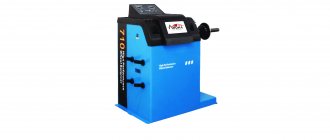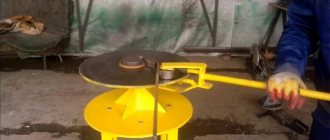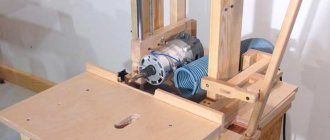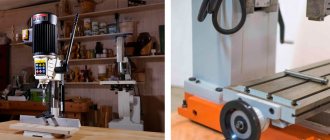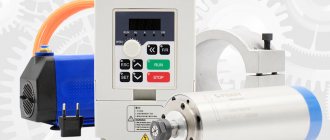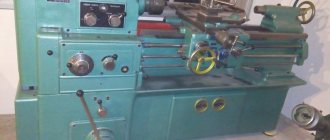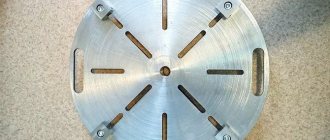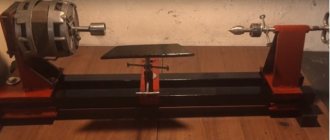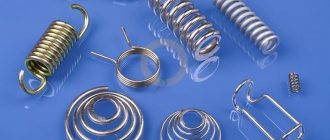Slotting machine is equipment for processing wooden and metal workpieces by chiselling, which means the reciprocating movement of the cutter from top to bottom. As a result of chiselling, flat or shaped ruled surfaces, parts with grooves and grooves, and various types of dies are obtained.
This article presents slotting machines. We will look at the functional purpose of the equipment, its design and operating principle, as well as get acquainted with popular factory-made units and provide instructions for making such a machine yourself.
Design and operating principle
The slotting machine is designed for processing hard-to-reach places, mainly located inside the limited space of the workpiece being processed, where other metal-cutting tools cannot reach. Gear teeth are also often cut using slotting machines.
A slotting machine, in general, consists of several main elements (Fig. 2).
Figure 2. Layout of slotting machine components.
1. Bed. The bed is the base of the machine and is intended to accommodate all other components and elements on it. Slotting machines are usually installed on a pre-prepared concrete platform with the level set to zero. At the bottom of the frame there are holes for mounting bolts that secure the machine to the floor. Sometimes the bed has the ability to adjust the machine level, which allows it to be installed on an uneven area with subsequent adjustment.
2. Lateral movement flywheel. Serves to ensure feed of the workpiece in the transverse direction. Each model of slotting machine has its own scale division price.
3. Handle for ensuring rotational movement of the workpiece. Impact on this control causes the table with the fixed workpiece to rotate. Basically, the rotational movement of the workpiece is required in the process of gouging out gear teeth or ring gears. Slotting machines are also often used to create internal spline surfaces, provided that the milling machine for some reason cannot carry out this operation.
4. Longitudinal feed flywheel. Provides longitudinal movement of the table with a fixed workpiece.
Modern slotting machines are equipped with an automatic feed system with adjustable parameters. This allows you to automatically create the required profile on the workpiece. The use of automation of the slotting process is especially widespread when creating parts with circular cyclic surfaces, such as gear wheels, gear rims, parts with splined surfaces, etc. In this case, the work of the machine operator is reduced to setting the feed speeds of the part, the speed and depth of penetration of the cutter and control part processing process.
5. Table (Fig. 3). Serves to place the workpiece. Often has removable holding elements that change depending on the specifics of the work being performed. It is often equipped with a chuck modified for a planer, which is used on lathes.
Main characteristics
In the following table I have collected the main characteristics of slotting machines.
Table of main characteristics
| Characteristic | Options | A comment |
| Processed material | Wood | Small machines come in tabletop or floor-mounted versions. Weight up to 100 kg with a cabinet is acceptable for both professional carpentry and hobby workshops. |
| Metal | Equipment for professional workshops and industrial workshops. Massive, heavy and expensive, despite the fact that it was mostly used. | |
| Work unit drive type | Mechanical | In a woodworking machine, rotation is transmitted to the drill chuck directly from the motor, which is located above the working unit - the good thing is that it does not require special maintenance, which is beneficial for the hobbyist. For metalworking equipment, a mechanical drive requires the presence of belt-gear transfer case options, which require daily monitoring of belt tension and the condition of the lubrication system - advisable only for professional use. |
| Hydraulic | Hydraulics move the working elements of the most powerful slotting and planing machines, which are operated by specially trained personnel. | |
| Working equipment | Drilling and grooving machine for wood | Drilling and grooving attachment – a set of a drill and a 4-sided chisel. |
| Metal slotting | Cutters of different shapes, sizes and configurations. | |
| Maximum dimensions of the processed workpiece, mm | 120-160 | Drilling and grooving machines. In the basic position – no more than 120; with branded rack extensions - up to 160. If you turn the rack in the opposite direction from the desktop, then the dimensions are limited only by the distance to the floor. |
| 500-700 | Metal machines. For serially produced vertical ones – up to 500. For planing ones – up to 700. | |
| Method for adjusting the supply of equipment | Manually | For working with wood. The design is equipped with a long lever, which allows you to plunge the square chisel into the hole being drilled without excessive force. The processing depth is controlled locally by the operator or limited by various stops. |
| Automatically | The frequency and depth of cutter stroke are set by the machine settings. Used on metalworking machines. | |
| Weight | Up to 100 | Woodworking desktop and stationary machines, the installation of which requires only a flat surface of the floor or workbench. |
| Over 250 | Metalworking equipment. It is fixed rigidly; for models weighing a ton or more, their own foundation is required. If high-precision machines (class B, A, C, T, K) are located nearby, then vibration isolation is necessary. |
On drilling and grooving machines, setting the position of the workpiece is done manually, in two different ways. Some models have a movable table on which the workpiece is mounted - the table with the part is adjusted in space with millimeter precision. And for others, you have to move the workpiece on a stationary table. For metal slotters, the part is fixed in a lathe chuck; the position is adjusted manually with an accuracy of hundredths of a millimeter.
In this article I will consider two of the most popular models - metal and wood.
Didn't find the machine you're interested in? Write to me, perhaps I am familiar with this equipment. Model summary table
| Model | Peculiarity | Average price, rub. |
| Woodworking | ||
| 1. | A good machine with decent functionality and high precision. Equipped with a set of 5 cutters with drills. But all the positive impressions are spoiled by the constant need to adjust it. For a hobbyist, the potential is huge; for continuous production, the machine needs to be modified and high-quality chisels and drills must be selected. | 23 000 |
| 2. | Professional equipment. Every detail is in its place, nothing superfluous. Minimum settings, maximum ease of use. It may seem that if there is no equipment, the machine is expensive, but there are fewer problems with it than with inexpensive models. | 28 000 |
| Metalworking | ||
| 3. | Reliable and powerful industrial machine for gouging and trimming horizontal surfaces. In the basic configuration, this equipment is not fully capable of replacing a vertical slotter, but by purchasing a universal dividing head for it, you can make internal splines and gears. | 100 000 |
| 4. | Repairable, easy to operate and maintain. But taking into account all its capabilities - internal splines, grooves, gears, including conical and complex shapes - its place is not in production line production, but in the repair shop. | 200 000 |
Classification and scope
Slotting machines differ according to several evaluation criteria. Let's consider the main of these criteria, which are applicable to highly specialized slotting machines.
1. Material processing:
- small - up to 1 ton;
- medium - from 1 to 10 tons;
- large - over 10 tons.
3. Machine feed control:
- with manual feed;
- with automatic adjustable feed.
4. Drive motor power. The larger the machine, the more powerful the engine is installed.
5. Frequency range of the working stroke of the cutter, regulated by the gearbox.
6. Maximum overall dimensions of the workpiece.
7. Maximum cutting force generated by the ram. Determines the feed rate and processing speed.
8. Processing precision.
There are several basic operations that are typical for performing on a slotting machine:
- creating holes of various shapes that are impossible or difficult to cut using turning or milling operations;
- cutting gear teeth and gears using a special cutter (Fig. 4);
Figure 4. Slotting machine cutter for cutting teeth.
- creation of spline surfaces, both internal and external;
- hollowing out keyways of various shapes (Fig. 5);
Figure 5. Creating a keyway using a slotting machine.
- cutting complex shapes in hard-to-reach places using shaped cutters.
Today, most of the operations performed by a slotting machine can be duplicated on machines of a different type. However, slotting machines do not lose their relevance due to the simplicity of their design, reliability and low cost.
Modern CNC machines are not classified as a separate category. The chiselling operation is one of many that the new generation of multifunctional machines can implement.
Sometimes it is necessary to make a recess, a groove, or some kind of material recess on the surface of a wooden or metal part.
You can perform the operation manually, but it will be much faster and more efficient to use a slotting machine. It is intuitively clear how such a rather narrowly specialized unit works.
Professional products are expensive and are used mainly in production, but for home work you can assemble the machine yourself.
What does the device consist of?
Both the homemade machine and the professional machine have the same content that allows the device to function.
Each device has a frame on which there is a table, a cutter equipped with sharp teeth, which is a tool for operating the device, a rocker mechanism with a box responsible for the speed of feeding, as well as a drive of one of three types (can be hydraulic, mechanical and electric).
A machine made by yourself is simpler, but professional hydraulic machines are more advanced, and it’s easier to work with your own hands.
The mechanism of such a machine also includes several component units: it operates thanks to a hydraulic system, a system responsible for cooling, a bed, a slotting cutter, a feed box, a table, a control system and equipment that is responsible for the operation of the system.
The hydraulic drive itself must be inserted into the frame; the device programs the forward and backward movements, which are performed by the slider.
This type of machine is used to create keyways, splines and grooves mounted on shaped or flat surfaces.
It is also used to work with flat or shaped surfaces, to create cuts and grooves for holes in the shape of a cylinder or cone, as well as to perform chiselling with undercuts at the required degree (but not more than 10).
The machine can be used for private or small-scale production, as well as in private workshops.
The machine is equipped with three types of table feeding capabilities, which allows you to work on a machine with multiple surfaces using only one type of installation.
The machine is also capable of multi-machine operation thanks to its table capabilities, programmed stop system and remote control.
The device is used to process, by chiselling, internal parts of flat and shaped types, grooves and grooves of various parts, as well as types of dies installed on the table itself, or fixed in specialized devices.
The machine is capable of processing the surface of parts at an angle without changing the original position of the part, due to the fact that the frame on which the cutter is located can be rotated.
The table can be moved both manually and mechanically, and thanks to the circular feed of the table, the machine can process gears or round-shaped parts.
Read also: How to calculate current power
The feed passes into the table through a movable cylinder connected to the hydraulic transmission.
The frame has three options for how the feed can move: circular, longitudinal and transverse - thanks to them, the table can be moved in three different directions at once: vertically, horizontally or in a circle.
A conventional or self-made device has only two planes along which the feed moves, so the advantages of a hydraulic device are obvious: it is easier to work with and the quality of the parts will be higher.
Principle of operation
According to their purpose, slotting machines are divided into two types: standard and specialized. Standard slotting machines are universal units that can be used to carry out a wide variety of operations. Specialized devices are designed for processing complex parts - punches, gears, etc.
The machines are driven by a drive. It can be equipped with three different types of mechanisms:
- crank;
- hydraulic;
- with a rotating scene.
The main processing tool is a hollow metal cutter (chisel) with a square drill inside. It is mounted on a vertical moving slider. The carriage allows you to drill even very large grooves in the workpiece.
The operating principle of the slotting machine is dual-mode. In the case of a simple mode, processing is carried out by repeated contact of the cutter with the workpiece at different points of the same plane. For example, a series of parallel holes of the same diameter and depth is drilled. A machine with a simple operating mode can be made manually.
In complex mode, the workpiece is processed in different planes, with multiple rotations of the carriage with the cutter in different directions, at different angles. This way you can drill grooves and recesses in hard-to-reach places on the part. Units operating in complex or combined modes are manufactured only using professional equipment. It is almost impossible to make such an installation at home yourself.
Popular models
If you need a professional slotting tool, the price of which corresponds to its quality and capabilities, we recommend that you familiarize yourself with the most popular models of machines and special accessories for them, which are recommended for work by experienced craftsmen.
JET JBM-5 (RUB 25,290)
The Jet tabletop slotting machine is equipped with a powerful motor. The frame is made of cast iron and steel, which gives the equipment the necessary stability. The unit allows you to adjust the depth level. The set includes a sleeve for various cutters, a fixing part for workpieces and a drill chuck.
Corvette 91 Pro (RUB 22,855)
The wood slotting machine is designed for drilling grooves and square holes in wood, and is equipped with five attachments, which include a drill and a square chisel. Smooth movement of the table on the slide is ensured by a mechanism that regulates the speed limit.
LBM 200 (RUB 87,883)
The LBM 200 drilling and grooving machines produce longitudinal grooves and round holes. The device allows you to fix the length and depth of the cut. The drilling head is controlled with one hand and is adjusted in height using a special handwheel. Professional tool features long-lasting and reliable operation
.
7D430 (RUB 2,460,000)
The device is designed to form grooves and grooves on flat surfaces. The machine provides longitudinal movement of a table with a diameter of 630 mm relative to the cutting element and is used in small manufacturing enterprises.
7A420 (85,000 RUR)
A machine with a mechanical drive, by rotating the frame with the cutter, allows you to process parts at an angle without changing their position. The unit cannot be built into an automatic line, but is distinguished by reliable operation and high productivity.
7A412 (80,000 RUR)
Thanks to the circular table feed, the machine of this model can process round workpieces. Provided that the dividing device is installed, wheels with a gear structure can be formed. The machine is characterized by long-term reliable operation and high process safety.
675 P (630,000 rubles)
The universal milling machine is characterized by high cutting accuracy. The workpiece can be fixed in both horizontal and vertical positions. It is equipped with additional accessories that significantly expand the functionality of the equipment. The machine can be equipped with a VDA-315 drilling and grooving attachment.
Purpose of the slotting machine
The device is best suited for automated processing of wood parts. This is a highly specialized automatic machine, very much reminiscent both in its appearance and in the list of main structural elements of a drilling machine. Using a slotting machine, you can make grooves, holes, nests, recesses, and channels in a wooden workpiece. To obtain profiles of the required dimensions, the machine is equipped with additional equipment.
All slotting machines are similar in their basic functions. These include:
- two-axis adjustment of the work table when moving;
- Measuring the groove size and distance between holes using a special measuring tool.
Varieties
If we talk about the types of slotting machines, we can distinguish two groups:
- Models for private workshops, garages. They are small-sized machines that can be installed on a workbench or have a steel base. Operated manually. To do this, the master installs the workpiece and clamps it with clamps. Next, he starts the machine and manually lowers the working part with the equipment to the workpiece.
- Industrial equipment. These are large-sized machines that are used for mass production of parts. The grooving machine is equipped with movable work tables, a powerful engine, and a cooling system.
Professional machines
The most successful domestic models are slotting machines GD-200, GD-320, GD-500. They are designed for small-scale production of parts from flat, cylindrical, conical and shaped blanks. By chiselling and drilling you can obtain splined and grooved recesses, keyways in the most inaccessible places of workpieces.
The height of the outer surface of the workpiece corresponds to the range of machines - 200, 320 and 500 mm. The size of internal treated surfaces should not exceed 250 mm.
Note! The most modern multifunctional model is S315TGI. It has a more complex structure than the units of the GD series.
The list of functions of this model includes operations on wood and metal. It is not difficult to assemble such a slotting machine with your own hands. The fact is that, unlike artisanal ones, in professional models the carriage with the workpiece can move in any direction - horizontally, vertically, diagonally. Various equipment helps the machine operator process workpieces along two circuits - closed and open.
Compared to other types of processing units, the slotting machine can move in a straight line, in opposite directions.
The cutter (cutting element) with the cutter mounted on it moves at an angle to the vertical plane. This makes it easy to process surfaces inclined to the machine axis. This is how grooves for wedge keys are made and dies are processed. It should be noted that professional slotting machines of the latest generation are successfully used in large-scale production of wood and metal products.
The operation of the units is ensured by asynchronous motors. They facilitate complex and time-consuming processing operations. Rotational motion is transmitted directly. This allows you to maintain high efficiency and ensure high productivity. Starting is carried out using magnetic starters. They play the role of fuses in case of possible unintentional starting of the engine.
Professional slotting machines differ from simpler models in their rather massive dimensions. Their installation must be done on frames or workbenches. The machine passport must contain its main characteristics. Mechanisms and equipment of professional machines must be equipped with certificates of conformity and documents for warranty service. Professional models can be equipped with CNC equipment.
Main models
The most widely used metal cutting machines are “GD”, produced under the 200 and 500 series. Also widely used are the 7a420 and 7403 metal slotting machines. The S315TGI model has the greatest functionality, which has recently been installed in workshops of various production lines.
When choosing the most suitable model, you should pay attention to the following points:
- Power of the installed electric motor. It can vary over a fairly large range. The higher the power rating, the higher the performance of the equipment. However, it should be taken into account that with increasing power of the electric motor, electricity consumption increases significantly.
- Tool sizes can vary significantly; some machines are adjustable, others are not.
- The presence of longitudinal and transverse feed can be called an important point. The less relocation of the workpiece is carried out, the higher the quality of the resulting part.
- Parameters for adjusting the speed of movement of the installed cutting tool.
When choosing the most suitable machine, you should pay attention to dimensions, weight, and equipment. The metal slotting machine 7403 can be called universal
Important selection criteria
Choosing the right unit is not as simple as it might seem at first glance. There are several important parameters, the complex of which will allow you to purchase exactly the kind of tool that is needed for the manufacture of parts:
- machine power;
- the ability to adjust components, assemblies and equipment;
- dimensions of processing tools;
- the ability to move the processing tool in different directions, in three planes;
- maximum angle of inclination and speed of the cutter.
In addition to specialized parameters, you need to take into account the dimensions and weight of the product. The stability of the bed and ease of operation directly depend on them. The unit is equipped with additional devices and equipment. Good equipment significantly increases the functionality and productivity of a slotting machine.
Familiarization with design features
A slotting machine is a hollow base that is used to hold a post in place. The structure has a column, inside of which the drive mechanisms are located. A cutter is installed on the front side of the stand, from the bottom of which a tool holder is fixed. The position of the cutter can be changed in relation to the tabletop using clamps.
The cutter will move, its stroke will determine the length of processing of the parts. The level of the cutter in relation to the workpiece can be adjusted. The slider, which has a drive, operates on hydraulic or mechanical traction. A wood slotting machine is quite simple to make; it can be used in furniture production. Such equipment is suitable for the production of any carpentry blanks.
DIY making
At home, according to the drawing, it is quite possible to assemble a homemade wood slotting machine. A steel stand with a diameter of 40 mm with a longitudinal groove and a groove at one end is vertically attached to a base (worktable) with dimensions of at least 350 x 350 x 20 mm. The height of the stand must be at least 500 mm. The stand with its machined end is inserted into the flange. The connection between the stand and the flange is welded, and the connection between the flange and the base is threaded.
To manufacture the machine console, two cylinders are used: a mandrel and a rack cylinder. They are welded with a steel square. The console is kept from turning as follows:
- using a fixing screw in the rack cylinder;
- using the locking screw in the mandrel cylinder.
An axle is welded to the ends of the rack cylinder to accommodate the feed levers. The material for making the levers is a strip of 30 x 8 mm. Levers with rods are connected by hinges and bolts.
The shape of the caliper is similar to a regular vice. The workpieces are fastened inside a three-jaw chuck on top of the movable platform. A correctly mounted support ensures that the workpiece is fed ideally to the cutter plane to the entire processing depth. With this machine you can make recesses in wood of the required depth as quickly as possible.
Equipment Features
You can create a metal slotting machine with your own hands only after considering the design features. The layout of a slotting machine, both professional and homemade, is identical. In this case, we highlight the following main components:
- The basis of almost any machine is the bed. It is necessary as a basis for securing all nodes and their correct positioning relative to each other. Steel can be used in the production of the frame; quite often the structure is welded from individual elements, but there are also folding versions.
- For chiselling, a tool with sharp teeth is used. They call him a dork. Its dimensions, profile and many other aspects determine the possibility of use in a particular processing case.
- The gearbox is installed on a slotting machine model, which has a wide range of applications. The transfer is necessary to change the processing parameters of the workpiece.
- The desktop can also be called one of the important design elements. The workpiece is fastened on the table. The main thing in manufacturing, when creating a homemade metal slotting machine, is to correctly position the work table relative to the cutting tool.
- It is worth considering the fact that the layout of a slotting machine can differ significantly depending on the type of installed drive: mechanical, electric, hydraulic. Often a hydraulic drive is installed on machines that are considered professional equipment. It is almost impossible to produce a hydraulic drive with your own hands. A model that you create yourself often has a mechanical drive.
- When considering the main components of a slotting machine, one should take into account the fact that the design may have a cooling system. Metal processing can lead to heating of the cutting tool and the workpiece.
Despite the fact that there are quite a lot of different models of machines on sale, many of them have a similar design.
Manual machine model
This is interesting: Rollers for profile pipes: we make manual profile bending with our own hands
